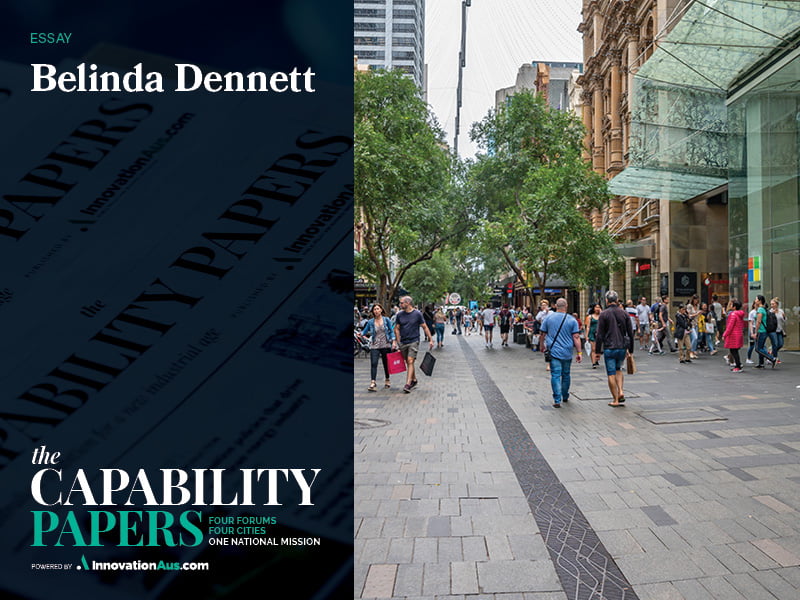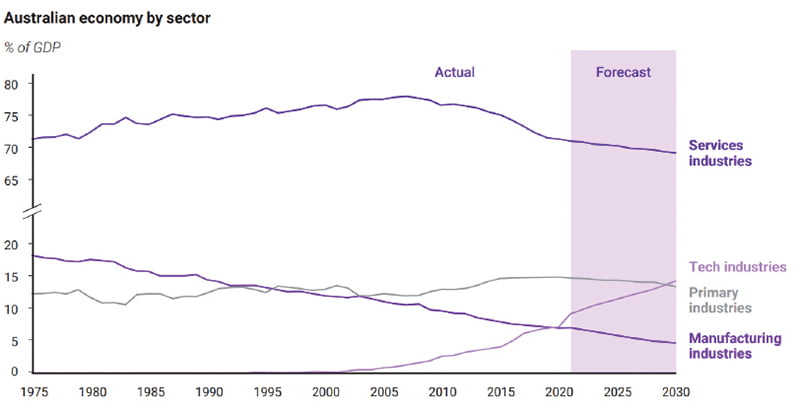In mid-2020, after the initial six-week lockdown, people were trying to make sense of what Covid-19 meant for the economy and society. What would we keep? What would return to normal?
Of course, in hindsight, such pondering was highly premature and it was naïve of us to think that the pandemic was already in the rearview mirror. Even three years on, it’s still not completely clear what changes will remain and where we’ll go back to our former lives.
Also in mid-2020, Microsoft released a report called Revitalising the Economy, where we discussed how a combination of pandemic-related disruption and geopolitical tensions had heightened concerns about countries’ reliance on international supply chains.

That only intensified in the next two years of closed borders, increased global demand for certain products and then the Russian invasion of Ukraine.
This led to increased debate about the notion of ‘sovereign capability’, based on legitimate concerns about our ability to avoid disruptions during emergencies and to preserve our national security and economy.
Microsoft understands these concerns and the desire to find solutions that protect and promote Australian interests and values. However, as a global technology leader, we also believe it’s important that such calls don’t lead to protectionist policies that hold Australia back from reaching its potential.
One thing that became abundantly clear during the pandemic and that hasn’t changed is the central role that technology plays in Australia’s competitiveness and resilience.
The nation’s digital infrastructure enabled people to switch to working and learning from home, and otherwise keep the country’s economy and social systems running.
Businesses adapted to the restrictions on their ability to operate, pivoted to new ways of operating and even created whole new businesses to capitalise on the new circumstances we all found ourselves in.
This ability to adapt, pivot and create is the result of a large and complex ecosystem that underpins Australia’s digital economy. And that economy is built on our ability to leverage world-leading technologies as well as create our own.
So, when it comes to maintaining and growing our capability, we believe it’s essential to understand the nature of that ecosystem.
Australia’s technology sector contributed $167 billion to the economy in 2021, or 8.5 per cent of GDP, and supported 861,000 jobs. That made it the third largest industry, behind mining and finance, and it was growing at four times the average pace of other sectors (see chart).

A key part of this ecosystem is international technology companies. Microsoft, for example, has had a presence in Australia since 1983 and now delivers its solutions in partnership with more than 9,000 local businesses.
These businesses employ 200,000 people in highly skilled roles in IT development, testing, sales, marketing and other areas. Our research has also found that this partner network invests $1.5 billion a year in building new and repeatable intellectual property.
Another important part of the ecosystem is the way Australian tech companies use global technology systems to launch their businesses and grow globally.
Local software success stories such as Airwallex, Atlassian and Canva have all leveraged hyperscale cloud infrastructure, for instance, to reduce their barriers to entry and connect with customers around the world.
Local and foreign businesses have also benefited from the trade and investment opportunities created by Australia’s open and market-oriented regulatory and legal environment.
As Trade Minister Don Farrell said when releasing the 2023 Why Australia Benchmark Report, “Investors are fuelling our burgeoning technology sector that is one of the largest and most innovative in the southern hemisphere…”
The Report credits Australia’s reputation as an open, stable, globally connected economy – as the reason we’re a leading destination for innovative startups, research organisations and large multinationals from around the world.
“We are a safe and reliable trading and investment partner and have solidified our position as the world’s 12th largest economy… More trade and investment leads to better paying jobs and the type of economic future we want for Australians.”
Global tech players make a particularly important contribution to Australia’s skills base.
According to an Accenture report titled Harnessing the hidden value – released in August 2023 by the Tech Council of Australia in partnership with Microsoft and LinkedIn – large, US-based tech firms hire more experienced workers, who in turn boost the productivity of less experienced colleagues.
They also pass on global expertise, knowledge and skills to local businesses, employees, entrepreneurs, professionals and government workers. This talent uplift is estimated to be worth $2.25 billion a year to Australia in productivity and economic gains.
The report outlines how US tech firms have also provided capital, technology and knowledge of processes and practices that can help support the growth of local tech companies and other businesses in the value chain.
As an example, it noted that US-based tech firms employ 18 per cent of Australian tech graduates and half of Australia’s successful tech startups were started or scaled up by individuals who gained experience working at US tech firms.
Microsoft is pleased to provide extensive direct support for Australia-based startup technology businesses and to have seen many of these succeed domestically and globally.
For example, the Melbourne-based employee experience company LiveTiles has grown from a team of 10 in 2014 to now employ 130 people across Australia, Asia-Pacific, Europe and the US.
It attributes its success to early support from Microsoft and its ability to leverage our infrastructure to build robust, scalable and cyber-secure products that can be sold internationally.
The question for policymakers is how to maintain the strength of Australia’s technology ecosystem to ensure the nation maintains its place as a world-class digital economy. In this respect, international groups rely on the same factors as local companies.
These include the strength of the nation’s education system; support for research, development and startups; modern infrastructure; and a level playing field with consistent rules for all participants.
It is also important to recognise that concepts such as risk, resilience and sovereignty should be considered carefully and often differently when it comes to technology.
The tech industry is largely global and standards-based in nature, which means that products created in one place will work in another. It is also an industry where each party builds on another’s work.
As Microsoft’s Chief Technology Officer Kevin Scott has said, “In 2023, no one would seriously entertain the thought that they need to build every piece of software that makes an application possible. We use the compilers, debuggers, operating systems, databases, software libraries and frameworks, clouds and cloud services, and other platform components available to us to build powerful applications quickly and efficiently for our users.”
Across the global tech industry, products and services are created and delivered via complex supply chains that span numerous countries, to bring together innovations or reach realistic cost points.
This means policy decisions must be taken with a global lens and that principles such as reciprocity, transparency and cooperation are vital for success.
On the flipside, decisions aimed at favouring domestic organisations, captured in protectionist policies, can undermine the health of the local tech ecosystem while reducing choice and utility for domestic buyers.
As Australia works to realise its ambition of being a globally competitive digital economy, it should harness the strength of its entire technology ecosystem and follow the lead of other successful countries.
That is to support domestic and international technology companies working together towards a common vision, while competing on a level playing field to deliver the best possible products and services to customers in Australia and around the world.
Belinda Dennett has worked for Microsoft Australia’s corporate affairs team since 2012 after five years working as a senior policy advisor to the federal government across technology and digital economy issues. Prior to working in government, Belinda held a range or corporate and public affairs roles in commercial and not for profit organisations. Belinda has formal qualifications in law and business.
Do you know more? Contact James Riley via Email.

